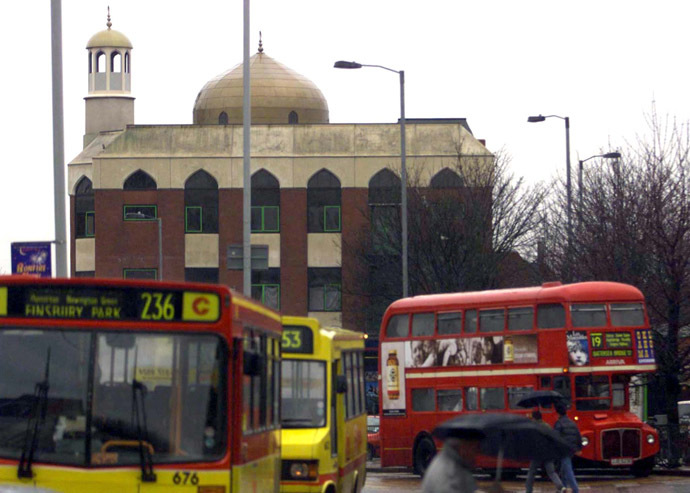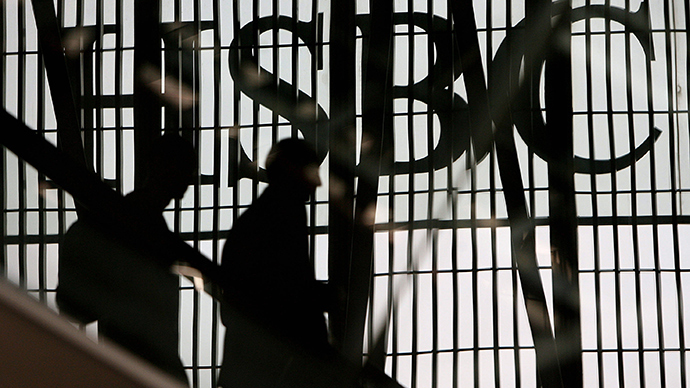HSBC has written to an array of UK Islamic charitable organizations to inform them their accounts with the bank will be terminated. One such organization has carried out relief work in crisis-stricken Gaza for over a decade.
In formal letters issued to a think tank, a charity and a North London mosque, HSBC claimed continued provision of its services would counter its “risk appetite".
Family members of a man who runs the think tank have also received similar letters from HSBC. But the multinational bank reportedly offered no explanation for its decision to withdraw its banking services in these cases.
HSBC is closing down accounts of registered charities supporting civilians in Gaza http://t.co/mVIxEXXvsa#LobbyHSBCforGaza
— Shahbaz Husain (@ShahbazWeb) July 30, 2014
Finsbury Park Mosque
Finsbury Park Mosque, the first of these charitable organizations, received a letter dated July 22 from HSBC confirming its bank account would be terminated. The bank notified the mosque’s treasurer that the account would officially close on September 22. The only explanation offered in the letter for this sudden termination was that the provision of such“banking services” now fell outside HSBC’s “risk appetite.”
Abu Hamza, who was convicted in the US of terrorist activities in May, formerly ran the mosque. Following Hamza’s departure from this role in 2005, the mosque's chairman, Mohammed Kozbar, insists a considerable degree of work was carried out to transform the establishment's image. Whether HSBC targeted the mosque as a result of Hamza's criminal conduct, however, remains unclear.
Mohammed Kozbar expressed disbelief that HSBC failed to offer him or the mosque’s treasurers an opportunity to address its underlying concerns. Insisting the organization’s financial flows are legitimate and firmly rooted in Britain, he is unable to comprehend the bank’s motivation for terminating the registered charity's account.
"For us it is astonishing - we are a charity operating in the UK. All our operations are here in the UK and we don't transfer any money out of the UK. All our operations are funded from funds within the UK,” he told the BBC.
"They have put us now in a very, very difficult situation - this is the only account we have,” he added.

Jeremy Corbyn, a Labour MP for Finsbury Park who has worked with the mosque since it was first built, condemned HSBC’s actions, stating he was “shocked” and “appalled” at the bank’s decision to withdraw the mosque’s banking services.
Ummah Welfare Trust
Another organization targeted by HSBC in this fashion is the Ummah Welfare Trust, an international relief and development charity that works to alleviate suffering and poverty throughout the world. Based in Bolton, the charity has channeled £70m to various projects in approximately 20 countries across the globe. It has also worked closely with the troubled Gaza Strip for a decade.
In a letter, also dated July 22, HSBC informed the trust its account would be terminated. The bank offered the same explanation it had given the Finsbury Park Mosque – the “provision of [such] banking services now falls outside our risk appetite.”
The charity has been an exemplary account holder at HSBC, according to the trust's director Mohammed Ahmad. In an effort to understand the motivations behind HSBC’s decision, Mohammed reportedly asked the bank's officials why the charity’s account was being terminated. He received no response.
@HSBC_UK_Press Its pretty shame HSBC targets Muslim Charities for their #SupportGaza. Israeli lobby group #HSBCpic.twitter.com/UNF2bSfdcq
— Mohamed Roshen (@Mroshen) July 30, 2014
Ahmad alleges the charity has been targeted by HSBC as a result of its efforts to provide emergency relief to Gaza in the form of grants, food aid, medical aid, and ambulances.
“This is the second time a bank has done this to us. Barclays did the same thing during the last Gaza war”, he told RT on Wednesday.
HSBC's motivation to terminate the charity's account is a direct result of stringent influence exercised by an array of pro-Israel lobby groups that are “lobbying hard to cripple and stop our work in Gaza”, according to Ahmad. Some of these pro-Israel groups are spreading damaging and inaccurate misinformation about the Ummah Welfare Trust, he claims.
One such group, Stand for Peace, has suggested on its website that the trust has links to Hamas. But Ahmad vehemently denies these allegations.
Because these nebulous organizations are “not newspapers or tabloids, we cannot take action”, Mohammad claims. And in the face of such blatant misinformation, the charity's reputation can be hard to maintain, he admits.
Mohammad emphasizes Ummah closely monitor organizations they work with to protect the integrity of their relief efforts, consciously avoiding any groups that have been blacklisted.
“We do a check on Thomson Reuters and make sure that there is no link whatsoever with blacklisted organizations. We don't want to damage our relief efforts. We have tried our best to be non-partisan as much as possible", he insists.
Cordoba Foundation
A third organization singled out by HSBC is UK-based think tank, the Cordoba Foundation. Run by Anas Al Tikriti, the Cordoba Foundation focuses on addressing the relationship between Europe and the Middle East. It was set up in 2005. HSBC's letter to the think tank was almost identical to that sent to the Finsbury Park Mosque.
But HSBC didn't just target the think tank's account. Al Tikriti claims his wife, himself, and his young sons also received personalized letters from HSBC informing them of their accounts' imminent closure. In the case of the Al Tikriti family, no explanation for HSBC’s decision was offered.
Originally born in Baghdad, Al Tikriti has lived in the UK for decades. Describing himself as a loyal and reliable account holder, he had banked with HSBC since the 1980s and had rarely been overdrawn. He has expressed grave concern that his entire family was targeted in such a flagrant fashion.
"It is unsettling. I am not used to being addressed in those terms. It's like I have done something wrong. The involvement of my family disturbs me,” he told the BBC.
Reflecting on the broader issue of Islamic organizations being singled out by HSBC, Al Tikriti observed that the majority of them are vocal on the issue of Palestinian rights.
‘Islamophobic campaign targeting UK Muslims'
This is not the first time HSBC had terminated swathes of bank accounts. In December 2012, the bank was forced to pay American authorities £1.2bn ($1.9bn) in a settlement relating to money laundering. HSBC had been accused of facilitating the laundering of funds emanating from drug cartels and states that were under US sanctions.
Following the settlement, HSBC requested over 40 consulates, embassies and High Commissions throughout the UK to terminate their bank accounts. The bank justified its actions at the time by claiming it had been “applying a rolling program of "five filter" assessments to all its businesses since May 2011, and our services for embassies are no exception."
Khalid Qumar, a trustee for the Finsbury Park Mosque, questions the motives behind HSBC’s decision to issue these letters. Qumar believes HSBC’s actions are indicative of an “Islamophobic campaign targeting Muslim charities in the UK".
HSBC is targeting Muslim organisations/organisers like @anasaltikriti & @UWT_UK. Watch out! pic.twitter.com/mn42E96DQz
— Islamic Angles (@IslamicAngles) July 30, 2014
But HSBC told the BBC the decision to close these accounts was "absolutely not based on race or religion".
HSBC has thus far been unwilling to clarify its precise motivation for targeting these Islamic charities. "We do not discuss relationships we may or may not have with a customer, nor confirm whether an individual or business is, or has been a customer”, a HSBC spokesperson said.
Gaza connection: politics or profit?
At present, the full extent of HSBC’s motivation for closing these accounts remains unknown. But a number of factors are worth noting. All charitable organizations recently targeted by the bank have Islamic roots. Both the Cordoba Foundation and the Ummah Welfare Trust are particularly vocal with respect to Palestinian human rights. And none of the organizations are currently being investigated by Britain’s charity regulator, the Charities Commission.
HSBC’s move to close these accounts follows Britain's Independent Reviewer of Terrorism Legislation’s recent claim the UK’s anti-terror laws are currently too broad and should be retained for their proper purpose.
Whether HSBC’s actions have been influenced by UK government officials' enforcement of Britain's anti-terror legislation, however, is unclear. Probed on this issue on Wednesday, a UK government source declined to comment.
Britain’s Charities Commission believes HSBC’s actions were an “independent business decision”. But the Commission is concerned about the implications of the bank's closure of UK Islamic charities' accounts. “If these services are declined or withdrawn from a charity, harm could result to the effective delivery of its charitable work and its ability to operate transparently,” the Commission told RT on Wednesday.
Nicholas Wilson, a HSBC whistleblower and UK-based financial activist, argues HSBC is operating with a pro-Israel bias in an effort to protect its financial interests.
“HSBC has a bank in Tel Aviv and have held a licence there since 2001. They claim on their website to be the only foreign bank in Israel offering private banking.It could therefore be possible that they consider being seen to bank for pro-Palestinian organisations puts them in conflict with their ambitions in Israel”, he said on Wednesday.
The British wistleblower - who is currently preparing a private prosecution against HSBC for its alleged role in widespread fraud - suggests the bank's decision to terminate these bank accounts may also have been influenced by the British government.
“The ex-head of MI5, Sir Jonathan Evans, is a non-executive director at HSBC on a salary of £150k per annum”, Wilson said. Evans' appointment was a "thank you for helping to protect Stephen Green from prosecution in the US over the Mexican drugs and sanction busting", he continued.
"The bank claims it’s useful to have someone with his intelligence and experience to protect them from risk but he’s obviously an establishment figure, with likely pro-Israeli views”, he added.
The director of the Ummah Welfare Trust stated on Wednesday he does not believe HSBC’s decision to close Islamic charities’ accounts was influenced by the British government. But he called for the coalition to intervene and stop this emergent trend. Such a move is both in the government and the wider British populace’s interest, he emphasizes.
Should further Islamic UK charities’ bank accounts be terminated, donors will employ other options to ensure their money reaches troubled Middle Eastern regions such as Gaza and Syria. Forcing them to direct their donations away from registered charities, will render such financial flows opaque, he warns.
When probed on whether HSBC’s targeting of Islamic charities’ accounts was political or profit-centred, Nicholas Wilson commented:"It’s a mixture of political pressure and realisation on the bank’s part that to be seen to be assisting pro-Palestinian organisations would damage their reputation in Israel and hence America."
Sarah Jane Brennan, RT

